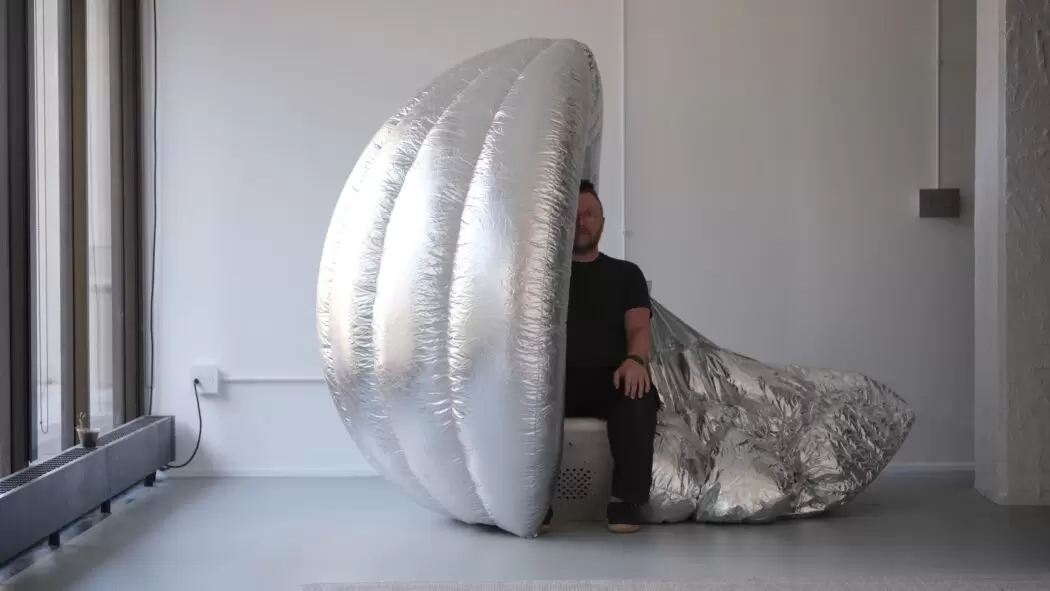Multimedia artist Dennis Rudolph on creating new virtual Walhalla
Dennis Rudolph is a multimedia artist working in performance, video, painting, graphics and writing. His artistic practice derives its primal momentum from a melancholic reworking of the heritage of western culture, making classical historical genres available for a contemporary artistic approach.


Above: Atlas Shrugged by Dennis Rudolph. Courtesy of Upstream Gallery.
Rudolph defines the manifesto of his practice the following way:
Art helps to gain control over the things in the world. Technology fundamentally changed my art and I became a painter of the 21st century. My practice is now irretrievably intertwined with technology. So who is in control: technology or the artist? Only the Gods can help us in this crisis of transformation into a life with technology and Artificial Intelligence. That is why I am creating our new virtual Walhalla in California City, a place for the Artificial Gods. The only way you can get there is through a new technology-based art.
Commenting on the question of how he started his journey in the universe of digital art, Dennis Rudolph says: “In an artistic crisis in 2012 I went to California to update Rodin’s famous sculptural work The Gates to Hell. My work Das Portal was to be open and had to stand on the threshold between two realities – heaven and hell. Thus I had to find a medium which is present and absent at the same time. With the appearance of consumer friendly VR headsets in 2017 I was able to finish the project: I painted Das Portal in a 3D VR painting program and placed it with a GPS based Augmented Reality App in California City, a failed urban development project in the Mojave Desert. VR became the other side. With your phone and the app you could see it and at the same time it wasn’t there when you lifted your eyes from your screen. This confrontation with the new mediums of VR and AR unleashed new inspiration for my art and completely changed the way I paint”.
In his practice, Dennis Rudolph frequently experiments with both AR and VR, creating a synergy of technology and art. The artist paints both with oil paint and digitally in VR. If one holds his phone in front of the artist’s work, immaterial large-scale figures suddenly start appearing, producing an effect of almost theatrical performance and placing the viewer within the artwork itself.
Answering the question of how the artist arrived at the idea of merging oil paintings and AR works, Dennis Rudolph answers:
I need physical things in my studio otherwise I would go crazy. In order to materialize the digital brush strokes I started using very thick paint, so as to give them back their body. Since my paintings are only a detail of the monumental digital 3D paintings of the Artificial Gods the paintings seem to be abstract. When you use my AR App it recognizes the painting and loads the full digital figure appearing at the same place where the detail was painted from. You then realize that the painting is not abstract but part of something bigger. When you look at old paintings, they are often a window into a utopian other world. With my paintings it is the other way round: now this other side is coming out of my painting into our world.
Dennis Rudolph’s main inspiration is the Baroque fresco by Cortona in the Palazzo Barberini in Rome. The illusionistic space of the ceiling painting fits the illusion of the VR and AR. For him doing art is a conservative act. As long as he communicates with the artists who lived and worked in the past, he feels that he is keeping the culture alive.

Das Kunstwerk der Zukunft by Dennis Rudolph. Courtesy of Upstream Gallery.
Dennis Rudolph says that “there was a big push towards digital art especially during the time of the pandemic here in Germany and Europe. Curators wanted to show art but the buildings were closed so they were looking for digital works that could be displayed online or outside the museums. This was also greatly supported by government funds. There is a new generation of collectors who are mainly interested in digital art, especially NFTs”.
Here are some examples of available domains related to this article’s main topics:
AR.art / VR.ART / virtual.art / unlocked.art / futuristic.art / aionline.art / digital-edition.art / walhalla.art
Start your journey today, pick a .ART domain on www.get.art





